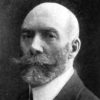Editor’s Note: In 2022, SUCCESS celebrates 125 years as a magazine. Since its inception, it has stayed true to its purpose: to provide its readers the tools, the inspiration and the recipe for improving their lives. Each issue, you’ll get a glimpse at that storied past, which highlights one important point: The world changes, but the tools of self-improvement are constant. This piece, originally published in July 1909, has been edited for length, clarity and style.
“How is it, I should like to ask,” said an indignant member of the Harvard University medical faculty, at one of its meetings, some forty years ago, “that after eighty years in which this faculty has been managing its own affairs, and doing it well, it is now proposed to change all our modes of carrying on the school?” “I can answer the doctor’s question,” replied young Mr. Eliot, who presided at the meeting. “There is a new president.”
The new president was a young man of thirty-five, fearless, bold, self-confident, with no respect for a thing just because it was old or had been done or used before. He had brand-new ideas about running a university, and he also had the courage as well as the ability to carry them out. He was determined to put new blood, new life into the old institution of which he had been made head, no matter what precedents he broke, or whose views he antagonized.
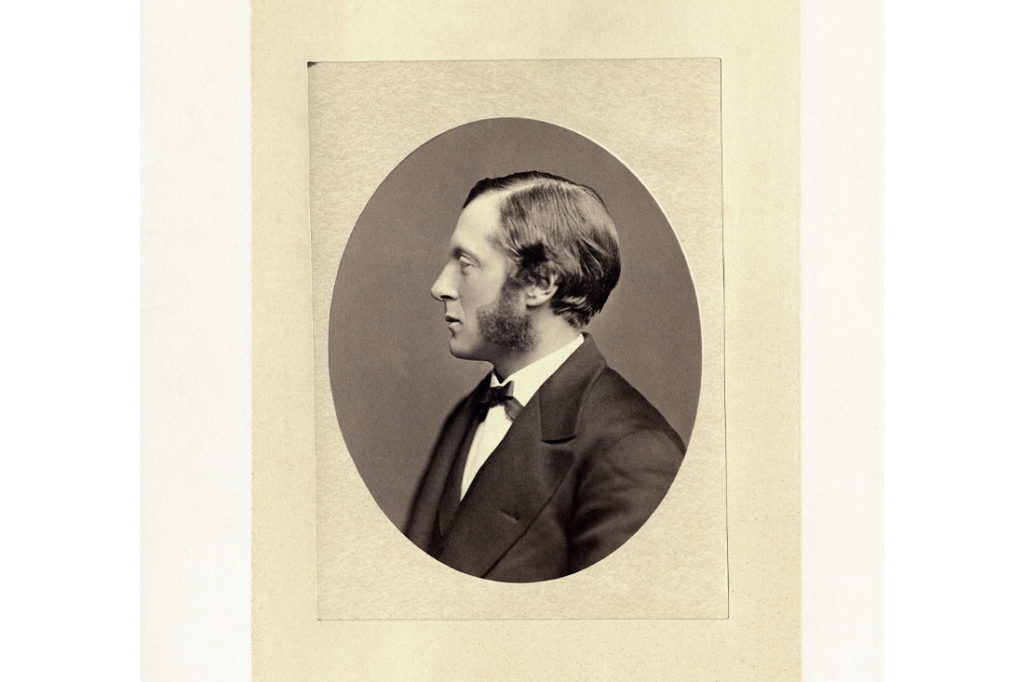
Young Eliot found the educational and religious systems of Harvard completely encrusted with traditions, but he was fearless enough and able enough to break through them, and, as a consequence, the little Unitarian college of four hundred students, under his brilliant leadership, became one of the greatest and most progressive universities in the world, with six thousand students, and with more instructors when he recently retired from the presidency than it had students when he stepped into power.
Perhaps no American in recent times has been such a great maker of men, such a revolutionizer of educational methods, such a breaker of educational traditions and medieval precedents, which have paralyzed so many of our colleges and universities, as President Eliot.
Leaders have ever been precedent breakers. Timid people, no matter how able, never make leaders. Fearlessness and originality are characteristic of all men of progress. They have no reverence for the old simply because it is old; with them it is always a question of pushing forward, of improving on the past, instead of slavishly copying it.
What Charles W. Eliot had done for the educational world, the Marshall Fields, the Wanamakers, the James J. Hills, the Carnegies have done for the business world.
Marshall Field was determined from the first that when customers came into his store they should see the marks of a vigorous originality everywhere, something different, something which they had never seen before. He was determined that whatever he did should be his own, that he would be himself, that he would not copy any other merchant, no matter how successful. He did not care what others did; he made his own program, blazed his own path. He was never afraid to trust his own judgment, or risk his reputation upon his own ideas. He was a born leader and was not afraid to go ahead, to blaze a new path which no merchant had ever trodden before.
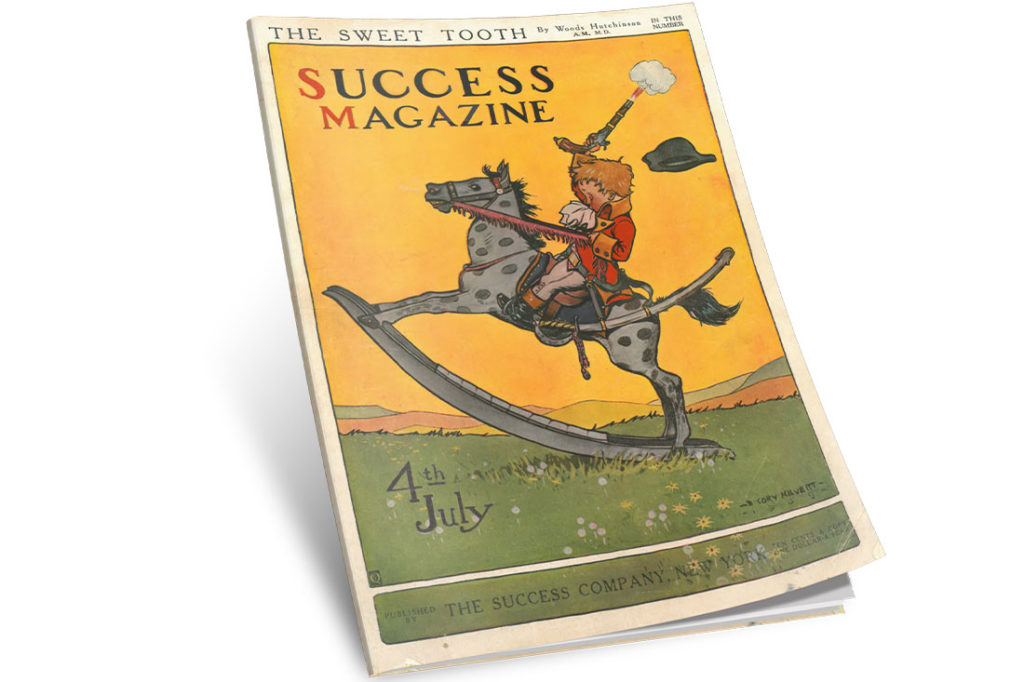
John Wanamaker did not say that because A.T. Stewart had been America’s merchant prince he would imitate him, follow him. Both Stewart and Wanamaker succeeded in a remarkable degree in the same store in New York, but their methods were as different as those of Wanamaker and Marshall Field.
Do not be afraid of being original, even eccentric; do not be a copy of your father, your grandfather, or your neighbor. This would be as foolish as it would be for the violet to try to be a rose. Every man is born to do a certain work in an original way. If he tries to copy some other man or to do some other man’s work, he will be a misfit, a failure.
A master mind can not be made to fit a pattern or to conform to any set routine or system. Every strong man’s achievement is an outpicturing of himself, of his individual ideas. What he manufactures and sells, the conduct of his business, the book he writes, the picture he paints, the sermon he preaches—this is the expression to the world of what was wrapped up in himself, not in someone else.
General Grant did what all the generals who condemned him for not following war precedents in text books on military tactics could not do, he ended the war. Napoleon ignored all previous war methods, broke all war precedents in his conquering march through Europe. Men of force and initiative are always breaking precedents.
Our great presidents have all been great tradition-breakers—the Washingtons, Jeffersons, Jacksons, Lincolns, Roosevelts—men who broke new ground, blazed new trails, and led people continually, vigorously, forward in the march of progress.
Roosevelt had little use for White House precedents or political traditions. In every position, where as police commissioner, Governor, Vice-President or President, he has always insisted on being himself—nobody else. He never tried to imitate or copy his heroes. No matter how much he admires a man, he never imitates him. A great deal of his remarkable force comes from being himself.
The imitator ruins his capacity for originality, for initiative; he loses his creative power; his inventiveness and resourcefulness are never developed. In fact, his executive ability—the ability to originate, to do things—is seriously crippled, if not utterly destroyed by his efforts to imitate some one else.
No human being ever yet made a success trying to be somebody else, no matter how great or successful that person might be. Success can not be successfully copied; it is original; it is self-expression. A man is a failure just in proportion as he gets away from himself.
Copied thought, always and everywhere, whether in books, sermons, paintings, or business methods, always lacks freshness, vigor, spontaneity, naturalness. The worked-over thought is like a warmed-over griddle cake; it lacks the crispness and flavor of the original.
It is not the artist who can faithfully copy Raphael or Millet who will become famous, but the one who can paint a picture that was never put on canvas before. The artist who can express his ideal in his own tints and colors, who can create something entirely new, all his own, is the one that will become a master.
Blaze your own way, or you will never make an impression on the world. It is originality that counts. The world makes way for the man with an idea. He is wanted everywhere. There is little room for learners, taggers, trailers, followers. The world is looking, as never before, for the man with original force, who leaves the beaten track and pushes into new fields; the physician, the surgeon, who dares to depart from the methods of those who have gone before him; the lawyer who conducts his case in an original way; the teacher who brings new ideas and methods into the schoolroom; the clergyman who has the courage to proclaim his message, the message that was given to him, and not that which was given to some other man who has put it into a book.
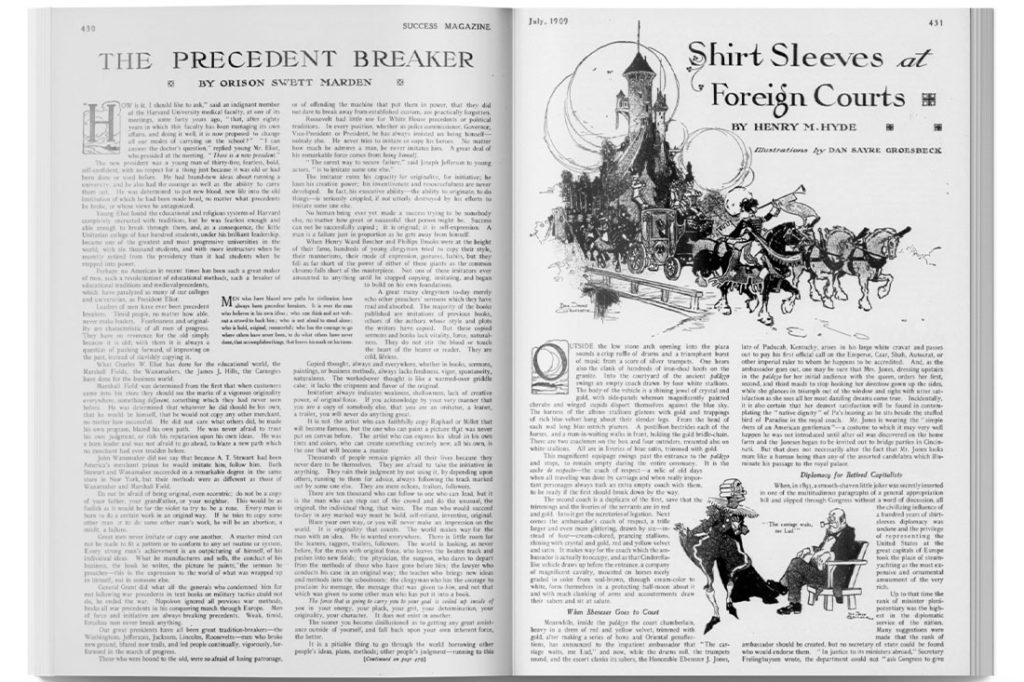
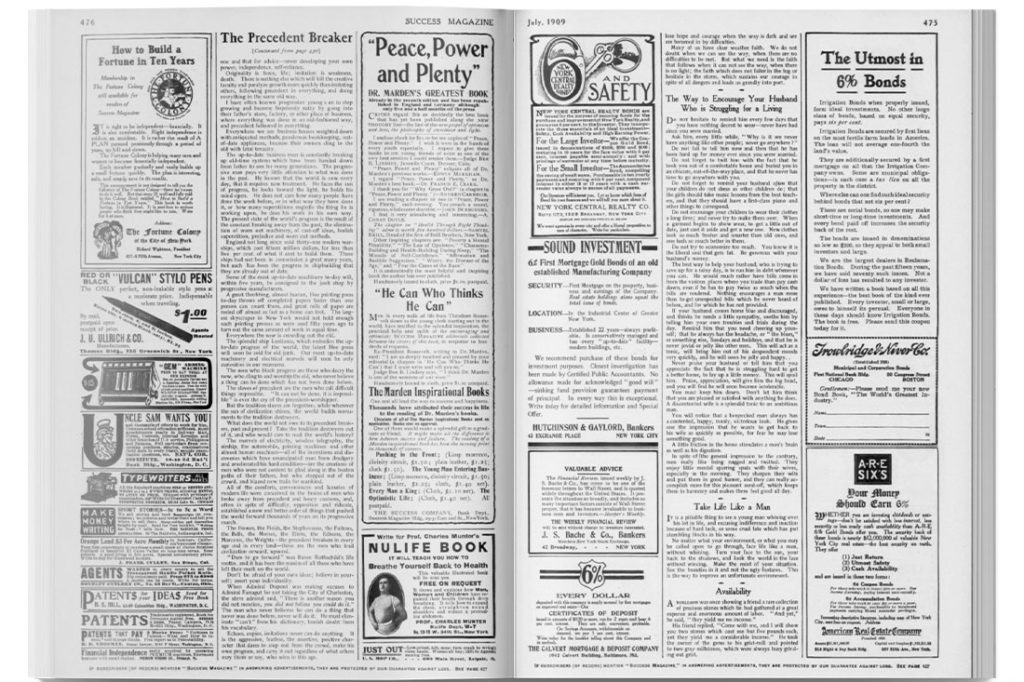
It is a pitiable thing to go through the world borrowing other people’s ideas, plans, methods; other people’s judgment—running to this one and that for advice—never developing your own power, independence, self-reliance.
I have often known progressive young men to stop growing and become hopelessly rutty by going into their father’s store, factory, or other place of business, where everything was done in an old-fashioned way, and precedent followed in everything.
Everywhere we see business houses weighted down with antiquated methods, ponderous bookkeeping, out-of-date appliances, because their owners cling to the old with fatal tenacity.
The up-to-date business man is constantly breaking up old-time systems which have been handed down from father to son for many generations. The progressive man pays very little attention to what was done in the past. He knows that the world is new every day, that it requires new treatment. He faces the sun of progress, he looks toward the light, he holds his mind open. He does not care how many people have done the work before, or in what way they have done it, or how many superstitions engirdle the thing he is working upon, he does his work in his own way. The present state of the world’s progress is the result of the constant breaking away from the past, the elimination of worn-out machinery, of cast-off ideas, foolish superstition, prejudice and worn-out methods.
England not long since sold thirty-one modern warships, which cost fifteen million dollars, for less than five per cent of what it cost to build them. These ships had not been in commission a great many years, but such has been the progress in shipbuilding that they are already out of date.
A great throbbing, almost human, how the printing press today throws off completed papers faster than one person can count them, and great rolls of paper are reeled off almost as fast as a horse can trot. The largest skyscraper in New York would not hold enough such printing presses as were used fifty years ago to turn out the same amount of work in equal time.
Everywhere the new is crowding out the old. Our most up-to-date machinery and electrical marvels will soon be only curiosities in our museums.
The marvels of electricity, wireless telegraphy, the airship, the automobile, printing machines and other almost human machines—all of the inventions and discoveries which have emancipated man from drudgery and ameliorated his hard condition—are the creations of men who were not content to plod along in the beaten paths of their fathers, but who stepped out of the crowd, and blazed new trails for mankind.
All of the comforts, conveniences and luxuries of modern life were conceived in the brains of men who broke away from precedent and hoary customs, and, often in spite of difficulty, opposition and ridicule, established a new and better order of things that pushed the world forward thousands of years on its progressive march.
The Howes, the Fields, the Stephensons, the Fultons, the Bells, the Morses, the Eliots, the Edisons, the Marconis, the Wrights—the precedent breakers in every age and in every land—these are the men who lead civilization onward, upward.
“Dare to go forward” was Baron Rothschild’s life motto, and it has been the maxim of all those who have left their mark on the world.
Don’t be afraid of your own ideas; believe in yourself; assert your individuality.
This article originally appeared in the March/April 2022 Issue of SUCCESS magazine.




